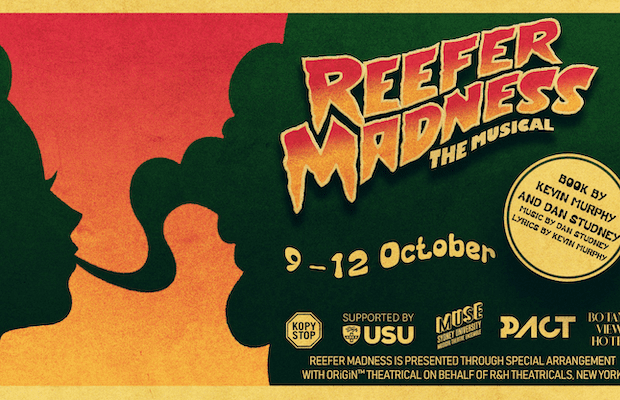The director of Reefer Madness has more hemp-infused kombucha than he knows what to do with.
When I walk into the PACT Centre’s theatre space, stagehands are putting together the set: a crooked high school sign flanked by two American flags hanging slack. I sit in the front row, joined by Robert Meek (that kombucha-happy director—the drinks were donated to the production team) and lead actor Jayden Castle.
“That needs to be turned straight,” Meek says of the sign, before turning to me to explain the show.
Reefer Madness, a production by MUSE (Sydney University Musical Ensemble), brought a haze of smooth jazz and slick satire to the PACT Centre last weekend. The show parodies a 1936 American anti-marijuana propaganda film of the same name, which promoted fear over the encroachment of “reefer” (weed) from Mexico into the homes of Middle America. The film was rediscovered in the 1970s, and in 1998 Kevin Murphy and Dan Studney created the musical adaptation, which lampoons the hysteria of the war on drugs.
“Reefer Madness [uses] silliness as a mechanism to promote a clear message against propaganda, against government-sanctioned shifting of ideologies among the general public,” Meek says.
According to Meek, Reefer Madness is an edgy alternative to MUSE’s usual fare of classic musicals, taking risks with its political commentary and general irreverence. Yet while it departs from the likes of, say, Gershwin, Meek thinks Reefer Madness works perfectly as a musical, since the genre’s over-the-top style matches the war on drugs’ melodrama.
Meek and his creative colleagues have been challenged to strike a “balance of sensitivity” with the show’s edgier content. Meek says the show has outdated lines—some casually using rape as a kind of comedy—which a contemporary audience wouldn’t accept as appropriate for satire. While Meek and his team chose to excise those lines, they did decide to keep racially charged remarks in the script, since the war of drugs has always harmed racialized communities like African Americans.
“Those are lines that make sense within the realm of the show to yank the audience out of the comfort of the satire,” Meek says. “[They] remind everyone that this silly show is all about a really awful thing that’s happened in history.”
That said, Castle says the joys far outweigh the challenges, with the cast and crew (who range in age from 18 to 30) gaining close connections over the course of the process. As Meek notes, the cast and crew have a group chat where everyone has to send a fire emoji at 4:20 p.m. every single day within one minute—and producer Britt Spry even has a daily alarm set at 4:19 p.m. so she doesn’t miss it.
(“Yeah,” Spry says, looking over and smiling from her seat nearby.)
Ultimately, Meek says, the show has something for everyone, with searing comedy, tight choreography, and virtuosic music that’s “way more brilliant than it needs to have been.”
Reefer Madness is one half of a repertory season: MUSE’s production of Little Shop of Horrors is coming up on 9-16 October in the PACT Theatre. The company is currently gearing up to select its next major production, set to go up in Semester 1, 2020—and it’s looking for new artists and performers to join the team.
“One of the benefits of doing small productions with a student society is you get to explore the [cutting-edge] side of musical theatre,” Meek says. “[In terms of ‘coolness’ and emotional depth,] there’s so much possible within the medium.”
I left PACT to kill time before the show—a bottle of hemp-infused kombucha in hand.





